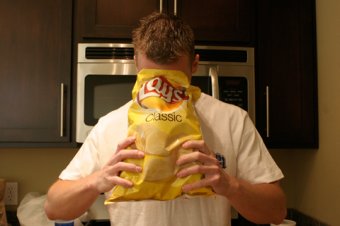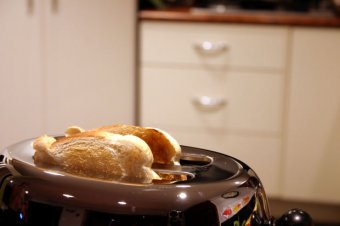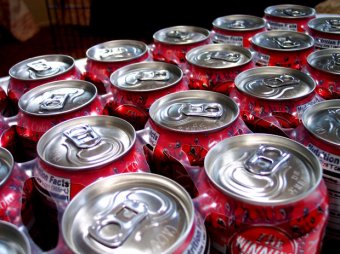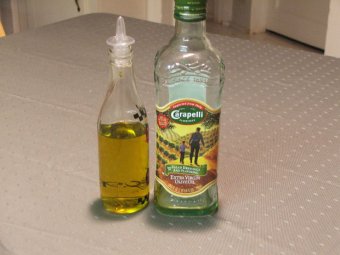

1. How Many Carbs Should You Eat?
- The problem with this is that many of us either gain fat easily because of genetics or we're way past our teen years and having a fast metabolism is a thing of the past. What it comes down to is that you can't gain muscle without at least a moderate surplus in calories over what your body burns in a day including exercise. However, excess carbohydrates may not be the right way to go for gaining size and staying lean.
Now before you take all your bread, pasta, and rice and beans and throw them away, listen up: Carbohydrates are the main source of fuel for our bodies... if you don't consume enough, your body will break down muscle for amino acids it can convert into glucose. Glycogen is the stored form of Carbohydrates in the body, and under normal circumstances, the body can store about 400 grams at a time.
So next time you crack open that Family Size bag of chips and dip and use the excuse that your "bulking", take that into consideration. When it comes to just weight lifting alone, your carbohydrate requirement is going to be based on volume (sets x reps x weight) and intensity (rest between sets, drop sets, free weight exercises like squats, deadlifts etc.)2.
Before You Start Feasting On Chips Remember Your Body
Can Only Store 400 Grams Of Glycogen At A Time.
 2. When Should You Eat Carbs?
2. When Should You Eat Carbs?
- Now, of the premeditated amounts of carbohydrates you're going to be taking in everyday, there is a timing issue with carbohydrates that must be taken into consideration to maximize its effect. The primary times to consume carbohydrates to take advantage of its protein sparing/anabolic capabilities is in the morning as soon as you wake up (because you haven't eaten for at least 6-8 hours and cortisol levels are elevated) as well as post workout (high glycemic carbohydrates after exercise causes insulin to spike which pulls amino acids from the blood and delivers them to muscle tissue).
Another important time for the consumption of carbohydrates is 1 to 1 1/2 hours pre-exercise. However pre-exercise carbohydrates suppress lypolytic activity (fats being metabolized during exercise)3. This is okay however, because in caloric surplus becoming leaner is almost impossible unless you're a novice weightlifter or you have good genetics. Just be sure to be wary of the glycemic index (a grading scale of how much different forms of carbohydrates spike insulin).
Your First Carbs Of The Day Should Be When You
Wake Up To Counter High Cortisol Levels.
3. How Do You Make Use Of The Glycemic Index?
- In general, lower GI foods are usually things like whole wheat bread, oatmeal, or anything else fibrous. High GI foods are usually those containing high amounts of sugar (regular soda, fruit juices, and fat-free yogurt, anything high in sugar).
 There is no evidence that sugar will make you fat (the concern is about total carbohydrates for the day and not necessarily glycemic index), but if you are trying to lose fat, the spike in insulin will prevent weight loss and the rush of sugar could cause you to "crash".
There is no evidence that sugar will make you fat (the concern is about total carbohydrates for the day and not necessarily glycemic index), but if you are trying to lose fat, the spike in insulin will prevent weight loss and the rush of sugar could cause you to "crash".
Have you ever heard someone say, "Ever since I stopped drinking soda and sugary juices I lost a couple pounds without doing anything"? For sedentary people (those who don't exercise on a regular basis) this can actually happen.
The fact is that the during the "low-fat" diet revolution that has been going on in the U.S. over the last few years, obesity rates have doubled (coinciding with "fast" and processed foods and also sedentary lifestyles). In an attempt to avoid fat, Americans have increased carbohydrate intake which has consequently increased their consumption of processed high glycemic foods (from high GI white bread, to high sugar fat free products)4.
For Sedentary People Cutting Things Like Soda
From Their Diet Can Result In Weight Loss.
4. Why Shouldn't We Avoid Fats?
- Most notable of the effects of healthy fats is reducing inflammation, increasing heart health, and lowering blood cholesterol. The fats you should be looking for are poly and mono-unsaturated fats, they are never solid at room temperature (ex: butter vs. olive oil).
 An easy way to up your dietary fats is to buy some peanut butter and eat your chicken breasts/ turkey sandwich with oil and vinegar for flavor.
An easy way to up your dietary fats is to buy some peanut butter and eat your chicken breasts/ turkey sandwich with oil and vinegar for flavor.
Supplementing with Omega 3 or eating fish at least twice a week is highly recommended as well. Omega 3 fatty acids help to keep blood pressure in check (bodybuilders put there blood pressure through the roof every time they're in the gym), decrease triglyceride levels (blood fats), which can aid in the decrease of atherosclerotic plaque (reducing plaque that causes blood clots) and reducing your chances of heart disease in general. As well as aiding in reducing inflammation; this is good for your immune system and joints.
The best example of a moderate fat diet that has the most proven long term success is the Mediterranean diet. A Harvard study was done with 101 men and women and what was discovered with the moderate fat Mediterranean diet (35% calories from fat, mostly monounsaturated from peanut butter, peanuts, mixed nuts, olive, canola and peanut oils) is that it increased compliance (it was easier for subjects to stay on the diet)5.
Despite the advocacy for healthy fats, moderate amounts of saturated fat should not be feared. Don't be scared of the saturated fat in your oils and peanut butter, and keep the saturated fats from your red meat in check (have your white meat chicken and turkey on a regular basis, switch it up with fish twice a week and steak once or twice a week so you don't get bored).
In a study done in the Journal of Applied Physiology they found that serum levels of testosterone were elevated following exercise with subjects who consumed a diet that was relatively high in fat6.
It is also well known that moderate amounts of fat while dieting for a contest are all a natural bodybuilder can do (outside of high intensity exercise of course) to make sure cortisol (a catabolic stress hormone) doesn't completely evaporate testosterone. Just be wary of the fact that high amounts of saturated fats increase the risk of cardiovascular disease7.
INTERESTING VIDEO












